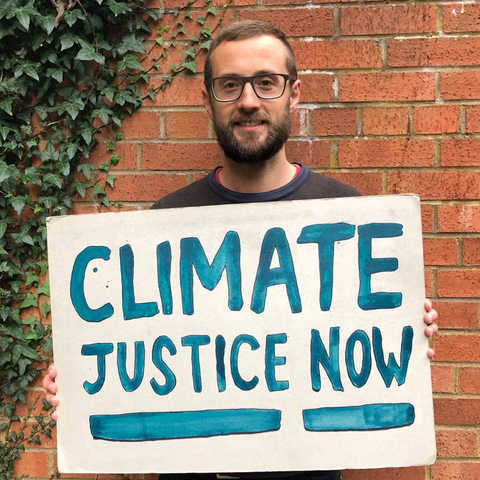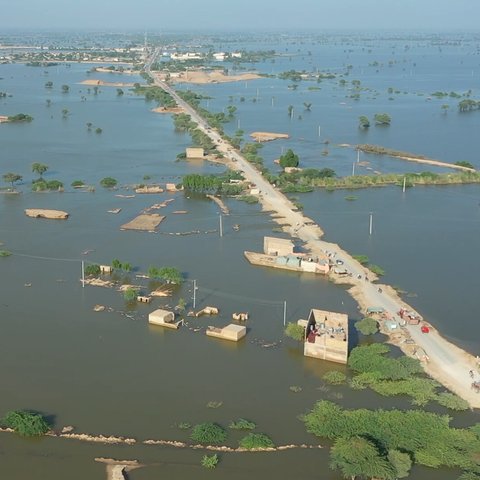As extreme weather grips the globe the government must hold big polluters to account
With extreme weather on the rise due to climate change, governments must tax the biggest polluters and make them pay for the damage caused
Extreme weather is on the rise
With large parts of the world currently facing blistering temperatures – and the wildfires, drought, disruption, famine and death that come in their wake – even a casual observer of the news is left in no doubt that extreme weather is on the increase – becoming more frequent, more intense, and more deadly.
The accelerated rise in temperatures on land and at sea are deeply concerning, with scientists warning that the record 50C+ heat hitting the US and China is just a glimpse of what lies ahead for many of us.
A bleak irony
It is bleakly ironic that while brutal heat engulfs vast swathes of the planet, toppling temperature records on an extraordinary scale – profits from big fossil fuel companies continue to run into the billions.
The ‘big five’ oil and gas companies saw their already colossal revenues more than double in 2022 with their combined profit of $200 billion. Shell previously announced the biggest annual profits in the company’s 115-year history, a staggering $40 billion.
Energy giants profit while the world struggles with climate change cost
The fact is that while the energy giants pump up their profits, the world is struggling to meet the cost of dealing with climate change; rising temperatures are literally making people’s homes uninhabitable. And away from the headlines about heatwaves in Europe and North America, extreme weather in East Africa is a key factor in a crisis that has left 40 million people without enough to eat.
As the oil and gas companies announce their second quarter profits, we should not be fooled by any drops from previous record peaks. The profits these companies make come with a climate change cost, imposed on us all and felt disproportionately by people in countries which can least afford it.
More climate response resources are needed
Meanwhile, the available resources needed to respond to climate change, whether it’s humanitarian aid for East Africa, long-promised funds to help lower-income countries adapt to climate change, or the finally agreed but not yet finalised loss and damage fund, are woefully inadequate. Even the UK government’s flagship pledge to deliver £11.6 billion in climate finance by 2026, is rumoured to hang in the balance.
As estimates suggest that low- and middle-income countries could face a bill for climate-fuelled extreme weather of up to $580 billion annually by 2030 – who should be putting their hands in their pockets?
The aid system is close to breaking point
The humanitarian system is already close to breaking point. An Oxfam report estimated that funding needs for UN humanitarian appeals linked to extreme weather were eight times higher than they were 20 years ago, while between 2017 and 2021 nearly half of appeal requirements had gone unmet - leaving a shortfall of up to $33 billion.
The pledge from rich nations to provide $100 billion a year to help countries adapt to the impacts of climate change such as extreme weather and reduce greenhouse gas emissions has also so far gone unmet, with only $83 billion provided in 2020. However, Oxfam calculated the real value of their spending was — at most — $24.5 billion, of which, only $11.5 billion was directed specifically for climate adaptation.
This is clearly not good enough; it is both unjust and unsustainable. A better future is possible if record temperatures prompt less helpless handwringing and more purposeful action.
The UK government must tax polluters fairly
To start with, instead of actively encouraging climate-wrecking fossil fuel projects like the proposed Rosebank oil field – for example through the investment allowance linked to the windfall tax – the UK government should be fairly taxing these rich polluters and helping to incentivise an equitable switch to clean, renewable energy. Campaign group Uplift estimate that based on figures from Office for Budget Responsibility, the forecasted spending on new oil and gas projects will result in a £11.4 billion tax relief on the sectors windfall tax bill between the second half of 2022 and end of 2027.
Companies are growing business and weakening emissions commitments while the world burns
It is scandalous that not only are they making enormous profits, but, for example, Shell has announced it intends to grow its natural gas business, while BP has weakened commitments to reduce emissions – all while the world burns and the poorest people pay the highest price.
Temperatures are only set to keep rising unless sharp cuts are made to emissions, and for that to happen the government needs to hold big polluters to account. We need to demand that people and planet are put before profit and greed, for the sake of us all – now – before it is too late.
More posts like this

26 Sep 2022
How can we help climate change stop hitting those who have done the least to cause it first and worst? And what can we do to stop climate change?

11 Jan 2023
Climate change results in more intense rainfall, which increases the chances of flooding.

Facts about droughts: The people who have done the least to cause the climate crisis are suffering the most. Communities are calling for system change not climate change.
